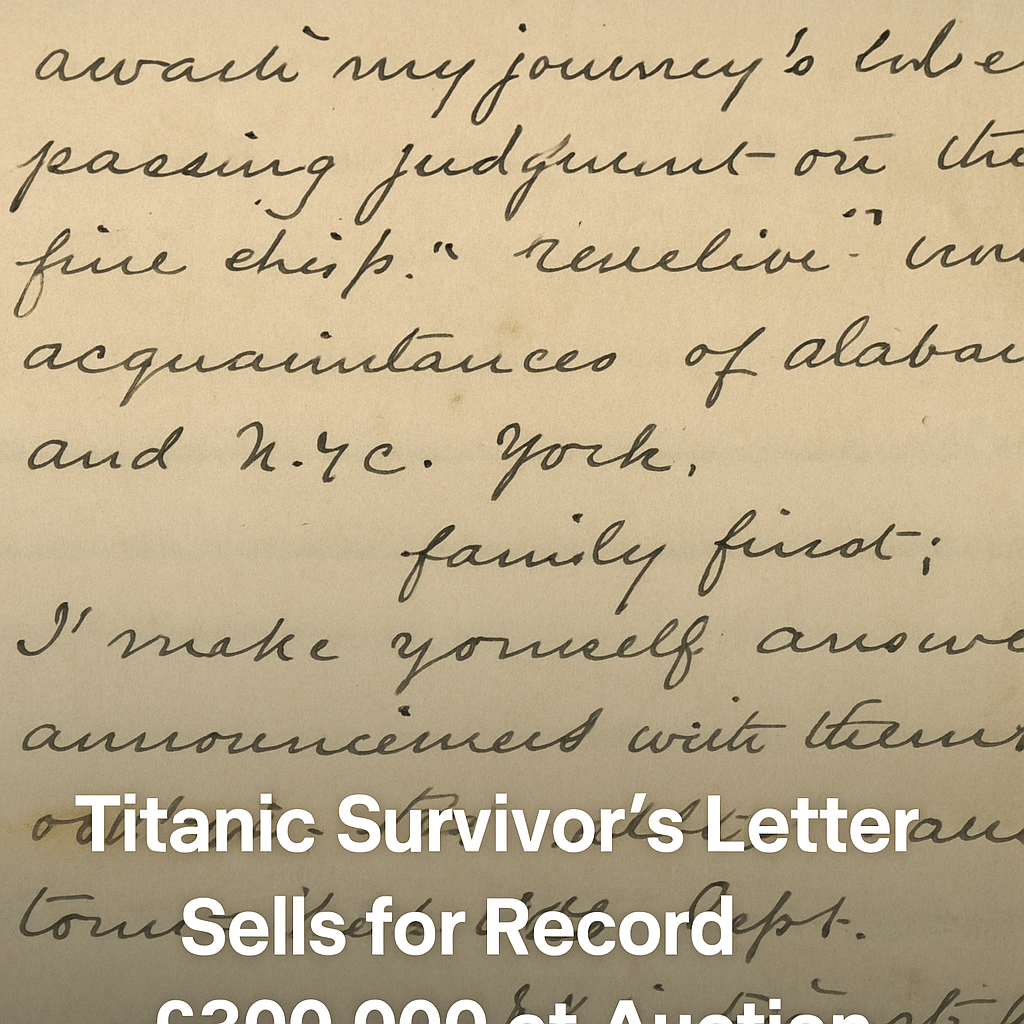In a remarkable event that captivated historians, collectors, and Titanic enthusiasts alike, a rare and haunting letter written by a Titanic survivor sold for a record-breaking £300,000 ($400,000) at auction in the United Kingdom. The letter, authored by Colonel Archibald Gracie, was snapped up by an anonymous bidder at the Henry Aldridge & Son auction house in Wiltshire, far surpassing its original estimated value of £60,000.
This historic piece of correspondence holds immense significance. It was written on April 10, 1912, the very day Col. Gracie boarded the RMS Titanic in Southampton, just five days before the ill-fated ship met its tragic end in the icy waters of the North Atlantic.
Described as “prophetic” by experts, the letter captures Col. Gracie reflecting on the Titanic with an eerie sense of foreboding. In his writing, he noted he would “await my journey’s end” before offering a final judgment on the “fine ship.” At the time, no one could have predicted that the maiden voyage of the world’s largest and most luxurious ocean liner would end in such catastrophic loss.
A Glimpse into a Historic Moment
Colonel Archibald Gracie was no ordinary passenger. A first-class traveler, he occupied cabin C51 aboard the Titanic. A seasoned military man and historian, Gracie had a keen eye for detail and a strong command of language, which is reflected in the letter he composed. His note was mailed the next day when the Titanic made a brief stop in Queenstown, Ireland (now known as Cobh) on April 11, 1912. The letter also received a London postmark on April 12, 1912, before setting across the Atlantic toward its intended destination.
In this letter, Gracie described his initial impressions of the ship and mentioned acquaintances on board. Yet, what has fascinated historians the most is the subtle sense of reservation expressed in his writing. Unlike the overwhelmingly positive testimonials from many passengers impressed by the Titanic’s grandeur, Gracie’s cautionary words now read as chillingly prophetic.
The Titanic Disaster: A Tragic Context
Just a few days after Col. Gracie mailed his letter, disaster struck. On the night of April 14, 1912, the Titanic collided with an iceberg and sank in the early hours of April 15. Out of approximately 2,200 passengers and crew members aboard, more than 1,500 lost their lives, making it one of the deadliest maritime disasters in history.
The ship, hailed as “unsinkable,” was a marvel of early 20th-century engineering and luxury. Its sinking sent shockwaves around the world, sparking widespread grief, numerous inquiries, and lasting changes in maritime laws. Against this backdrop, artifacts like Col. Gracie’s letter offer invaluable firsthand insight into the human experiences tied to the tragedy.
A Survivor’s Harrowing Story
Colonel Gracie’s survival is itself a gripping tale. As chaos engulfed the Titanic in its final hours, Gracie demonstrated remarkable bravery. He helped women and children into lifeboats and was among the last to leave the rapidly sinking ship. When the final plunge came, he was swept into the freezing Atlantic waters.
Amid the darkness and frigid conditions, Gracie managed to scramble onto an overturned lifeboat along with several other men. Battling exhaustion, hypothermia, and overwhelming fear, they clung to the capsized craft until rescue arrived. Sadly, more than half of the men who initially reached the overturned lifeboat perished before dawn, succumbing to the merciless cold.
Though Gracie survived the night, the ordeal left him physically shattered. He suffered from severe hypothermia and internal injuries that would plague him for the remainder of his life. His physical decline was swift and devastating.
From Survivor to Historian
Following the disaster, Col. Gracie became one of the most vocal and committed chroniclers of the Titanic tragedy. He poured his efforts into writing a detailed account of the sinking, determined to set the record straight for posterity.
His book, “The Truth About the Titanic,” remains one of the most respected and cited eyewitness accounts. In it, he vividly described the sequence of events, the heroism of the crew and passengers, and the profound human cost of that fateful night.
Unlike many survivors who avoided speaking about their trauma, Gracie embraced his role as a witness. He corresponded with fellow survivors, gathered testimony, and worked tirelessly to compile a definitive narrative. His contributions have greatly shaped public understanding of the Titanic’s final hours.
A Life Cut Short
Unfortunately, the physical and emotional toll of surviving the Titanic disaster proved too great. On December 2, 1912, less than eight months after the sinking, Colonel Gracie fell into a coma. He died two days later on December 4, with complications from diabetes and the lasting effects of his injuries hastening his demise.
In his final days, Gracie remained preoccupied with the Titanic and its victims. According to those close to him, he continued to speak of the disaster even as his life ebbed away.
The Auction and Its Significance
The recent sale of Gracie’s letter underscores the enduring fascination with the Titanic. The letter not only shattered auction records for Titanic-related correspondence but also highlighted the deep emotional and historical resonance of personal artifacts from the tragedy.
Auctioneer Andrew Aldridge described the letter as “one of the most important Titanic letters ever auctioned,” emphasizing its unique timing, prophetic content, and the author’s later role in documenting the disaster. The bidding war among collectors reflected a growing appreciation for authentic voices from the past, particularly those tied to world-changing events.
Items associated with the Titanic often command high prices at auctions, but Gracie’s letter stands apart because it combines historical importance, personal emotion, and literary quality. It’s a snapshot of a moment suspended between hope and doom a rare and tangible connection to one of history’s most infamous voyages.
A Legacy That Endures
More than a century after the Titanic sank, the fascination with its story continues to captivate imaginations around the world. Films, books, exhibitions, and academic studies have kept the memory of the disaster alive, often focusing on the human stories behind the statistics.
Colonel Archibald Gracie’s letter serves as a powerful reminder of the human element within great tragedies. It’s a document written not by a distant historian, but by a man who lived through the unimaginable a man who, even in his final days, sought to honor the truth and preserve the memory of those lost.
The sale of his letter reaffirms the importance of personal narratives in understanding history. While the Titanic’s sinking remains a colossal tale of hubris, fate, and human error, it is through the words of individuals like Col. Gracie that we glimpse the personal courage, sacrifice, and resilience that also define its story.



